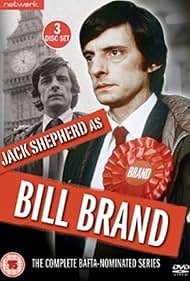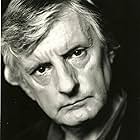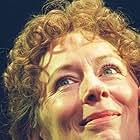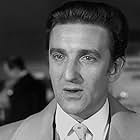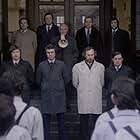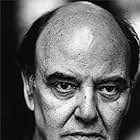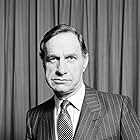Bill Brand is a new left-wing firebrand MP who gets involved with the political issues of the day (mid 1970s), while experiencing frustration with the remoteness of parliamentary politics an... Read allBill Brand is a new left-wing firebrand MP who gets involved with the political issues of the day (mid 1970s), while experiencing frustration with the remoteness of parliamentary politics and complications with his personal life.Bill Brand is a new left-wing firebrand MP who gets involved with the political issues of the day (mid 1970s), while experiencing frustration with the remoteness of parliamentary politics and complications with his personal life.
- Nominated for 1 BAFTA Award
- 1 nomination total
Browse episodes
Photos
Storyline
Did you know
- TriviaThe theme music is a new arrangement of the theme from the Dutch adventure series Floris (1969), composed by Jack Trombey using the pseudonym Julius Steffaro at the time.
- ConnectionsFeatured in Verity Lambert: Drama Queen (2008)
Featured review
Bill Brand evokes a long-gone era of the 1970s when the left pushed hard to take over the British Labour Party - long-gone but relevant, because this is the milieu in which Jeremy Corbyn, since 2015 the leader of the Labour Party, learned his politics.
The series is brilliantly written, from a left wing perspective, but it wears its bias on its sleeve, is not judgmental, and it is a sufficiently honest piece that the contradictions and problems with the position are displayed and wrestled with. Bill Brand (earnest Jack Shepherd) is a newly elected Labour MP, from the party's far left. He is tortured with doubt about the best way to achieve his socialist aims, but has absolute certainty about the correctness of his Marxist theory. But the Labour Party is a broad coalition, in which university-educated theorists like Brand rub shoulders with the working class and trade unions, who have a more pragmatic (and small-c conservative) view of their interests. The Parliamentary Party seems to have its own separate concerns.
Brand joins a group organised around a left wing journal, clearly based on the Tribune Group. A beleaguered Labour government with a tiny minority struggles on under a wily Prime Minister, who suddenly resigns. Can the left take this opportunity to force its own view on the party? Is Parliament a realistic route for socialism, or will it have to emerge from protest outside? Are ideologues like Brand, and pragmatists like his agent Alf Jowett, cabinet ministers like Venables or even prominent leftists like David Last, fighting for the same thing in different ways, or for different things entirely?
This was a highly topical series in the 1970s. It would have seemed arcane and remote in the 1980s and 1990s. Once more, in the 2010s, it is right on topic, as Corbyn has made it to the top of the Labour Party with the help of an extra-Parliamentary internet-based insurgence from a large group of activists later christened Momentum. The split between the working class and the highly educated middle class is evident, for example in Brexit. If anyone wants to get a sense of the nature of Corbynite thinking, this series is as good a place as any to start.
It is also an interesting commentary on the historical events of 1976, with many thinly-disguised characters. Arthur Lowe appears as a Harold Wilson figure - Wilson had suddenly and surprisingly resigned as Prime Minister just 2 months before this series began. Alan Badel plays the ambiguous David Last, Michael Foot in all but name. Ray Smith is a fiery trade unionist. Godfrey Quigley plays the Denis Healey role. The background of the Northern Irish troubles appears once or twice. But it is entirely focused on the Labour Party - there are few trade unionists, and hardly any Tories, Nationalists or Liberals appearing. Almost all the 'ordinary' people are party members.
It is a gritty and realistic series, that places the politics in the context of a deindustrialising Northern town and the febrile environment of Westminster. Brand's tangled personal life features prominently, with the young Cherie Lunghi as his inspiring but difficult teenage girlfriend. Indeed, the 1970s Labour Party was largely blind to sexual politics, but this series is quite ahead of the curve as Brand tries to rethink gender relations. Some well-known directors cut their teeth on the series. It wasn't a comedy by any manner of means, but it brings its politics to life.
The series is brilliantly written, from a left wing perspective, but it wears its bias on its sleeve, is not judgmental, and it is a sufficiently honest piece that the contradictions and problems with the position are displayed and wrestled with. Bill Brand (earnest Jack Shepherd) is a newly elected Labour MP, from the party's far left. He is tortured with doubt about the best way to achieve his socialist aims, but has absolute certainty about the correctness of his Marxist theory. But the Labour Party is a broad coalition, in which university-educated theorists like Brand rub shoulders with the working class and trade unions, who have a more pragmatic (and small-c conservative) view of their interests. The Parliamentary Party seems to have its own separate concerns.
Brand joins a group organised around a left wing journal, clearly based on the Tribune Group. A beleaguered Labour government with a tiny minority struggles on under a wily Prime Minister, who suddenly resigns. Can the left take this opportunity to force its own view on the party? Is Parliament a realistic route for socialism, or will it have to emerge from protest outside? Are ideologues like Brand, and pragmatists like his agent Alf Jowett, cabinet ministers like Venables or even prominent leftists like David Last, fighting for the same thing in different ways, or for different things entirely?
This was a highly topical series in the 1970s. It would have seemed arcane and remote in the 1980s and 1990s. Once more, in the 2010s, it is right on topic, as Corbyn has made it to the top of the Labour Party with the help of an extra-Parliamentary internet-based insurgence from a large group of activists later christened Momentum. The split between the working class and the highly educated middle class is evident, for example in Brexit. If anyone wants to get a sense of the nature of Corbynite thinking, this series is as good a place as any to start.
It is also an interesting commentary on the historical events of 1976, with many thinly-disguised characters. Arthur Lowe appears as a Harold Wilson figure - Wilson had suddenly and surprisingly resigned as Prime Minister just 2 months before this series began. Alan Badel plays the ambiguous David Last, Michael Foot in all but name. Ray Smith is a fiery trade unionist. Godfrey Quigley plays the Denis Healey role. The background of the Northern Irish troubles appears once or twice. But it is entirely focused on the Labour Party - there are few trade unionists, and hardly any Tories, Nationalists or Liberals appearing. Almost all the 'ordinary' people are party members.
It is a gritty and realistic series, that places the politics in the context of a deindustrialising Northern town and the febrile environment of Westminster. Brand's tangled personal life features prominently, with the young Cherie Lunghi as his inspiring but difficult teenage girlfriend. Indeed, the 1970s Labour Party was largely blind to sexual politics, but this series is quite ahead of the curve as Brand tries to rethink gender relations. Some well-known directors cut their teeth on the series. It wasn't a comedy by any manner of means, but it brings its politics to life.
Details
Contribute to this page
Suggest an edit or add missing content

